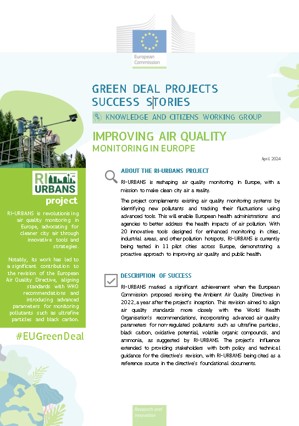About PROJECT
RI-URBANS is reshaping air quality monitoring in Europe, with a mission to make clean city air a reality. The project complements existing air quality monitoring systems by identifying new pollutants and tracking their fluctuations using advanced tools. This will enable European health administrations and agencies to better address the health impacts of air pollution. With 20 innovative tools designed for enhanced monitoring in cities, industrial areas, and other pollution hotspots, RI-URBANS is currently being tested in 11 pilot cities across Europe, demonstrating a proactive approach to improving air quality and public health.
Description of success
RI-URBANS marked a significant achievement when the European Commission proposed revising the Ambient Air Quality Directives in 2022, a year after the project's inception. This revision aimed to align air quality standards more closely with the World Health Organisation's recommendations, incorporating advanced air quality parameters for non-regulated pollutants such as ultrafine particles, black carbon, oxidative potential, volatile organic compounds and ammonia, as suggested by RI-URBANS. The project's influence extended to providing stakeholders with both policy and technical guidance for the directive's revision, with RI-URBANS being cited as a reference source in the directive's foundational documents.
Furthermore, RI-URBANS developed 20 tools to support the current assessment of air quality, introducing advanced parameters to support the further standardisation of air quality monitoring across Europe. These tools encompass a wide range of methodologies, including measurement protocols, mapping, emission inventories, modelling tools, and epidemiological approaches to assess the health effects of non-regulated pollutants.
RI-URBANS has also produced detailed reports for each advanced parameter, demonstrating the value of measuring these factors throughout Europe and providing guidance for scaling up these measurements to a European level. This comprehensive approach underlines RI-URBANS' pivotal role in enhancing air quality monitoring and contributing to the improvement of air quality management and public health in Europe.
Highlights
- RI-URBANS contributed to the European Commission's initiative to revise the Ambient Air Quality Directives, integrating recommendations for monitoring non-regulated pollutants like ultrafine particles and black carbon, aligning with World Health Organisation guidelines.
- The project has developed 20 innovative tools to enhance air quality monitoring, including measurement protocols, mapping techniques, emission inventories and modelling tools aimed at improving air quality assessment and management.
- RI-URBANS has produced detailed reports for each advanced air quality parameter, demonstrating the value of incorporating these measurements into Europe-wide monitoring efforts.
- The project provides guidance for the European-wide implementation of these advanced monitoring techniques, supporting standardisation efforts in air quality management.
Outputs
The 10 general recommendations and five technical recommendations that RI-URBANS made to the European Commission regarding their new EU Air Quality Directive can be found published on its website.
RI-URBANS has also published its 20 advanced Service Tools, which can be used to assess air quality within urban areas. Service Tools fall under the following categories:
- Protocols for the measurement of novel air quality parameters
Guidelines for how to measure new or unusual aspects of air quality. - Methodologies for vertical profiles of pollutants and meteorology
Techniques for understanding how pollutants and weather conditions change at different heights in the atmosphere. - Methodologies for source apportionment receptor modelling
Methods for identifying where pollutants come from and how they are distributed in the environment. - Methodologies for urban mapping of novel air quality parameters
Approaches for creating maps showing the distribution of new air quality factors within cities to help visualise where these pollutants are concentrated and where they might be coming from. - Methodologies for evaluating the health effects of novel air quality parameters
Ways to study and understand how new air quality factors affect human health, and to determine if exposure to these pollutants can cause health problems, such as respiratory or other illnesses. - Obtaining emission inventories for novel air quality parameters
Collecting data on the sources of new pollutants. - Modelling methodologies for novel air quality parameters
Techniques for using computer models to simulate how new air quality factors behave in the environment and to predict how these pollutants will spread and interact with other substances in the air.
Impact
RI-URBANS has made a substantial impact on air quality monitoring across Europe, playing a crucial role in shaping the new European Air Quality Directive. With its advanced tools and insights, the project has improved strategies for tackling urban pollution, making air quality management more effective and cost-efficient. This project has facilitated a better understanding of air pollutants, while also setting new benchmarks for monitoring and safeguarding public health.
Lessons
RI-URBANS connected and combined knowledge from various stakeholders from scientific and research institutions and air quality monitoring communities to ensure that different perspectives were captured. The recommendations and Service Tools were developed through joint discussions with these perspectives in mind. The project has identified that whilst some countries have established links and synergies between these communities, others need further support to make these connections and doing so will support future legislation and tool development.
Other information
RI-URBANS aims to bring the tools it has developed further afield and expand into cities and countries that have not yet been partnered with the project. After the end of the RI-URBAN project, the tools and open data will form part of the strategy of project partner ACTRIS, so that their implementation can continue.

